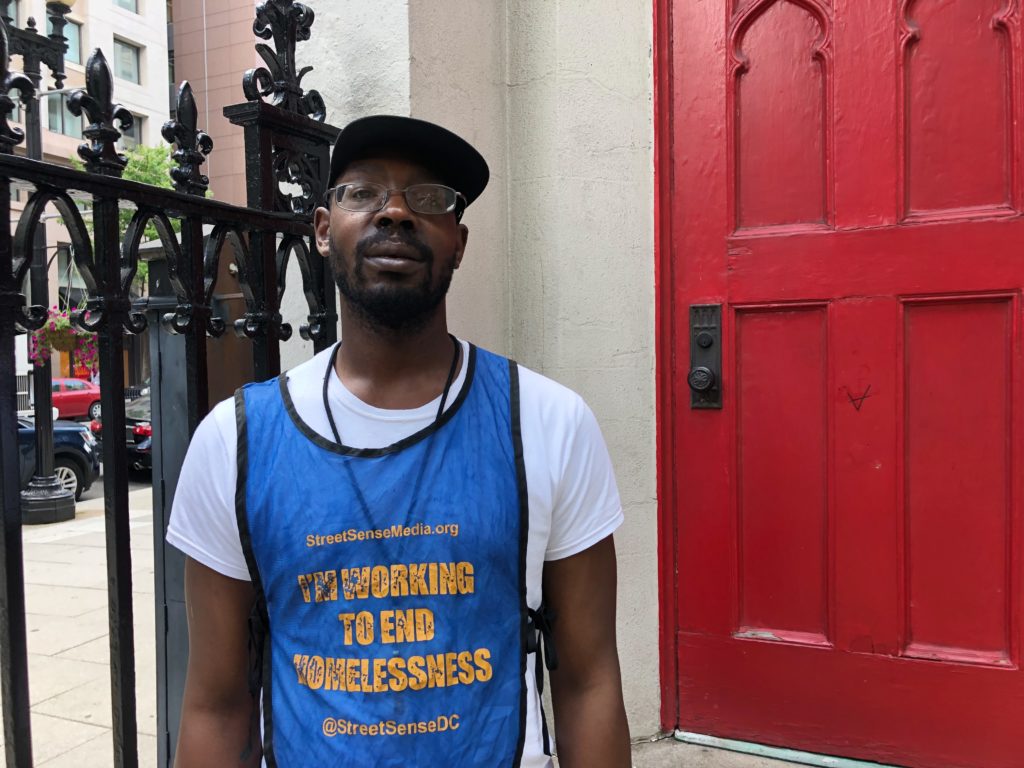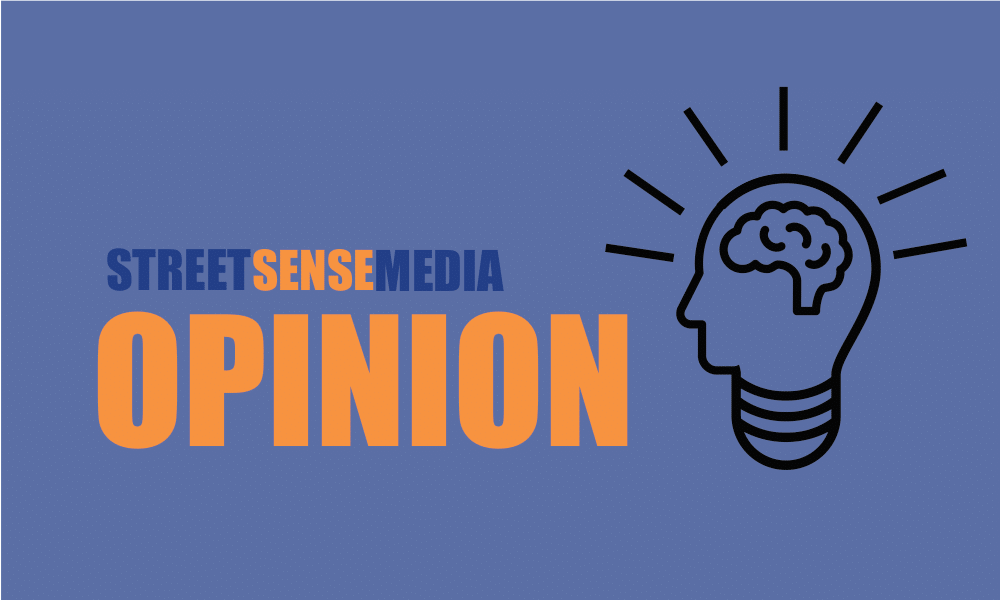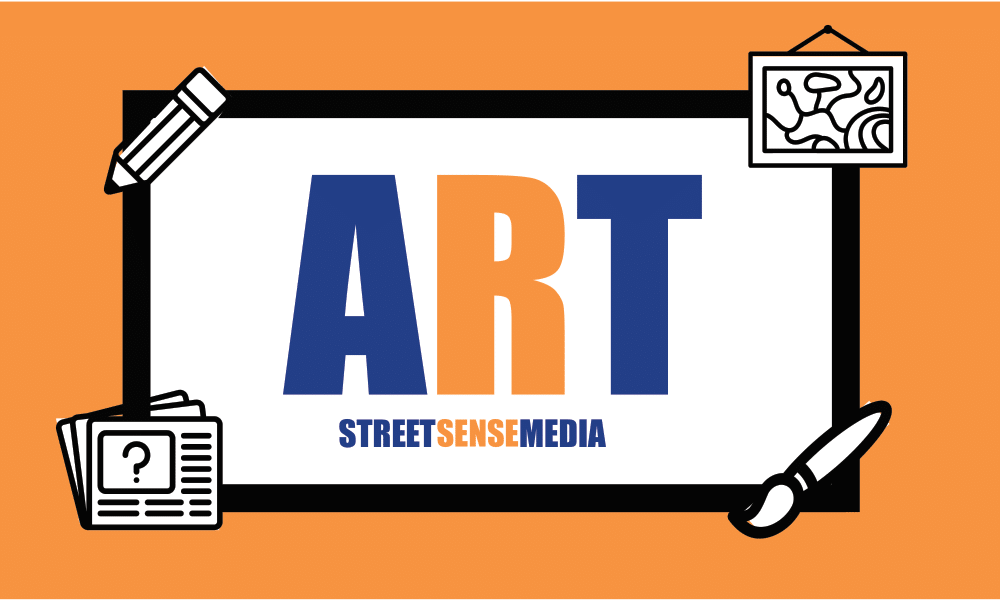Sporting his Street Sense Media vest, Reginald Black walked up to a downtown D.C. restaurant counter in 2016 to order a meal. Before he had even ordered, he was informed he would have 30 minutes to eat.
Black was perplexed. Why was he allowed only 30 minutes when other customers had clearly been there for longer?
“I figured it was the vest,” Black said, as the logo affiliates him with a homelessness organization. “I still ordered my food and I tried to kind of just brush it off, but I don’t know, I just couldn’t.”
So he asked for a supervisor. But after conversing with the employee whose seemingly arbitrary conduct Black was calling into question, the supervisor dialed the police. Black said he didn’t yell or cause a scene, but promptly found himself with a barring notice.
“The police actually should have been able to provide me a human rights form,” Black said. “But they couldn’t.”
Black’s story is a familiar one. In a 2014 survey of 142 people experiencing homelessness in D.C., around 93 percent of respondents reported experiencing discrimination on account of their housing status, primarily from private businesses and law enforcement.
The D.C. Human Rights Act of 1977 protects individuals from discrimination based on 20 distinct traits, from race and sex to credit information and political affiliation. However, although the law includes “place of residence or business” as a protected trait, D.C.’s anti-discrimination policy does not specifically protect homeless people. While Black could have ostensibly filed a human rights complaint under another trait, such as “personal appearance” or “place of residence,” it could be difficult to prove.
At-Large Councilmember David Grosso sought to rectify this shortcoming in July 2017 by introducing the Michael A. Stoops Anti-Discrimination Amendment Act, named for a man who helped found the National Coalition for the Homeless and dedicated his life to advocacy. The bill never received a hearing after being referred to the Committee on the Judiciary and Public Safety, chaired by Ward 6 Councilmember Charles Allen.
[Read more: Michael Stoops, tireless warrior to end homelessness, has died]
Black has been campaigning for this bill since its inception. Since Grosso reintroduced the bill in March, he has been urging the Council to set a hearing date before the summer recess begins on July 15.
The bill stagnated in 2017, according to Grosso, because the D.C. Council “just hadn’t built enough momentum.” As a result of the Council’s biennial restructuring of its committees in January, the latest version of the bill was referred to the Committee on Government Operations, chaired by Ward 4 Councilmember Brandon Todd. The committee chair did not respond to questions about when to expect a hearing, but Grosso does not expect it to take place before the fall.
[Read More: This anti-discrimination bill could help people escape homelessness, if the D.C. Council would give it a hearing]
Grosso said the bill, if implemented, would affect a wide range of issues, including housing, employment, health care, and transportation.
“It will definitely have an impact around MPD interactions, which I think is important,” Grosso said. “And it will also have an impact, I think, with the way businesses are interacting with the homeless.”
Of the five councilmembers on the Committee on Government Operations, Brandon Todd, Brianne Nadeau, and Grosso co-introduced the Stoops Act. Though the bill has the backing of two additional councilmembers plus one co-sponsor, Grosso said some of his colleagues and their staff don’t believe homeless status should be elevated to greater protection.
Grosso disagrees. “I think while some people believe that homelessness is protected by other parts of the Human Rights Act, we don’t think it’s gone far enough. We believe it has to be explicitly stated and singled out,” he said.
The Office of Human Rights may require additional staffing, though the amount of funding necessary will remain unclear until the chief financial officer releases a fiscal impact statement for the bill. OHR Director Monica Palacio said she is confident OHR would see a “significant increase” in cases filed under the D.C. Human Rights Act if the bill is passed.
OHR’s caseload has been increasing steadily each year. An increase as a result of new protections under the bill, however, would indicate that many voices are not protected under the current law. Data Courtesy of the D.C. Office of Human Rights / Chart created by Brianna Bilter with Infogram.
Anti-discrimination legislation will not end the criminalization of homelessness, but the affirmative protections outlined in the Stoops Act are a step the National Law Center on Homelessness and Poverty deems necessary. The center found that citywide bans on camping in public increased by 60 percent between 2011 and 2014, according to a report released in February. Seventy-four percent of people surveyed in a study of 1,600 people experiencing homelessness could not identify a place where it is safe and legal to sleep.
Grosso confirmed the bill includes the “right to rest” — or the right to use public spaces — but Deputy Mayor for Health and Human Services Wayne Turnage does not believe the legislation, as introduced, would alter the District’s current encampment sweeping practices.
Bans on the use of public spaces are only one indication that the criminalization of homelessness is on the rise. In a 2017 analysis of the criminalization of homelessness by governments worldwide, Amnesty International wrote, “Whether through anti-vagrancy laws, policies which block homeless access to essential services, or punitive measures and sweeping operations to force them out of the city, authorities are trampling on the rights of homeless people.”
The Stoops Act would not only make it illegal for businesses to refuse service to somebody who appears homeless. It would also provide a medium for people to redress malpractice in hiring processes. Most people experiencing homelessness interviewed for a study published by Yale Law Journal in 2017 “referred to discrimination during the job application process as the most significant problem facing the homeless community.”
The majority of homeless people are situationally homeless and have marketable skills and experience in the workforce, according to Shelters to Shutters CEO Andy Helmer. His organization works in the apartment industry to connect people experiencing homelessness, referred by nonprofits, to jobs in maintenance tech, groundskeeping, and lease consulting.
“If you have a population within your community that actually has the skills that you’re looking for, but you’re overlooking them, then the community suffers,” Helmer said.
Helmer works in an optimal sector to address housing and employment simultaneously. But his team is considering expanding this model to other industries, such as capitalizing on the shortage of long-haul commercial truckers or establishing a temp agency to give people practical experience in new fields. Shelters to Shutters recently established a City Advisory Board in D.C. to build partnerships with other local industries.
“I think there’s overall a tremendous sense of people wanting to help,” Helmer said. “So that is not something unique to the apartment industry.”
According to the National Law Center, the barriers to employment are furthered by criminalization strategies. And the line between source of income discrimination and racial discrimination is often blurred.
Both the National Law Center and the National Coalition for the Homeless urged D.C. to pass a Homeless Bill of Rights in response to discrimination. The Stoops Act only provides for some of the protections provided in homeless bills of rights passed in other U.S. jurisdictions.
Housing discrimination disproportionately impacts communities of color and perpetuates cycles of homelessness. Data Courtesy of Equal Rights Center / Infographic created by Brianna Bilter.
Correction (07.02.2019)
This article has been updated to include the full name of the National Law Center on Homelessness and Poverty. It previously referred to the organization as “the National Law Center.”








